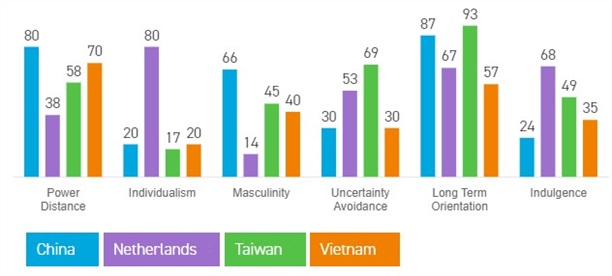Cultural differences between Asia and The Netherlands
February 5, 2020 | 3 min read
What's it like to live and to study in The Netherlands as an international student? What cultural differences can you expect to experience and how can you overcome these contrasts? Hofstede's cultural dimensions model explains how and why cultures vary. In this blog, TIAS Full-time MScBA students Tiffany, Ruby and Yiqing from (respectively) Taiwan, Vietnam and China compare their cultures to the Dutch culture based on the six values of the Hofstede model.
It has been several months since our arrival in The Netherlands. We are all savoring every living moment in this peaceful country and at the same time, we’ve noticed some cultural differences that we would like to share with other students. We believe that differences don’t make things harder, but can make us stronger and achieve greater maturity. Our observation can be somewhat objective; however, we hope it can be a useful reference for those who want to know more about the student life at TIAS, as well as in The Netherlands.

Power distance
The subordinate-superior relationship has been engraved in Asian cultures for a long time. People are educated to show high respect towards the elderly and those in higher social positions. This perception has both up and down sides. On the one hand, it helps people to have an optimistic attitude towards other’s capacity for leadership. However, being too aware of power distance could make people forget their own voices. This is completely different in the Dutch culture, in which all individuals in society are equal in right, responsibility and their own interest as well as benefit. They are free and confident in speaking out their own thoughts. Vice versa, Dutch people also welcome voices from everyone, regardless of their positions. Therefore, this is what Asian students can learn from and put effort to apply into their work-life situations.
Individualism
It is clear to say that Asian countries have maintained a highly collectivistic culture where people act in the interests of the others, rather than for themselves. Meanwhile, Dutch culture are well-known for a loosely-knit social framework in which individuals just need to focus on their own benefit. This might be one of the contributing factors to the conflicts in groupwork that has a mix of Dutch and Asian people. Since Dutch people are very focused on the individual rather than the group, they find it hard to listen and perceive other opinions. Therefore, it takes time for both cultures to understand and get along with each other. The mix of Dutch and Asian culture could be a perfect combination as Asians can learn to be more expressive as an individual, and Dutch people can learn to be more amiable with other people.
Masculinity
Most people from Asian countries are success driven, it’s either go big or go home. You will be able to find shops or stores opening until very late at night, simply because in this kind of environment when everybody is out there to win, leisure time doesn’t matter that much anymore. But in the Netherlands, everything has a reasonable opening and closing time. People will not sacrifice their weekends just to earn some extra money. It also applies the same when it comes to studying, generally, Asian students are constantly aiming at straight A's, while the Dutch know how to have fun at the same time.
Uncertainty avoidance
Asian people tend to be more relaxed when associating with rules and schedules. Meanwhile, you should be prepared to book everything at least 1 weeks upfront in the Netherlands. At first this might drive you crazy if you’re not used to this highly strict schedule, and to be fair, it’s pretty hard to get used to. But with due time, the advantage gradually shows. You get a complete calendar, everything is organized and in place.
Long term orientation
Asian culture emphasizes long term savings and investments for future generations. People in typical Asian countries work to save and invest, which focuses on long term achievement to prevent future changes. On the other hand, people in the Netherlands also put much effort into achieving long term goals. However, they tend to have a better work-life balance. For instance, most Asian people tend to overwork and over-emphasis workplace achievements for earning more money. Yet the Dutch have a better working schedule, which enables them to spend more time with their family and enjoy their own leisure time. Therefore, we could conclude that Asian countries are more long-term oriented, and work hard for their savings and the future. The Dutch might be slightly less focused on long term goals, but emphasize more on present happiness.
Individualism
The Dutch have a high score on indulgence, which shows that the society is more optimistic and more willing to changes. Furthermore, the Dutch are more like a free child with a more adventurous spirit and a carefree mind that accept spontaneous plans and quality leisure time. For instance, Dutch students enjoy having drinks and hanging out with each other after class. Most of the Asian cultures are more reserved and follow the rules and traditions. They worry about the future, which results in not taking risks or not having excitement in their life. Therefore, they consider all the consequences before taking any actions and will always plan everything. Focused more on stability, Asian people seek for long term happiness and future success.
In conclusion, there are many cultural differences between Asian countries and The Netherlands, but with mutual understanding and effort, one can learn a lot from these cultural contrasts and grow professionally.
Want to learn more about studying and working in The Netherlands as an international? Read our online magazine 'The Netherlands: small country, big opportunities'.
Read online magazine